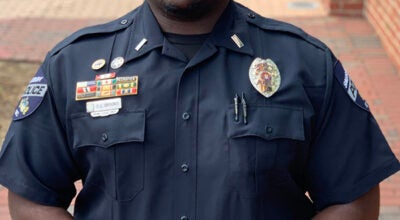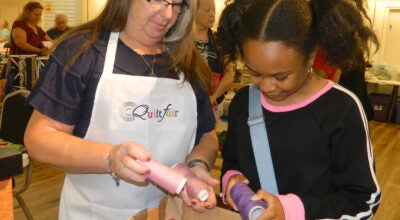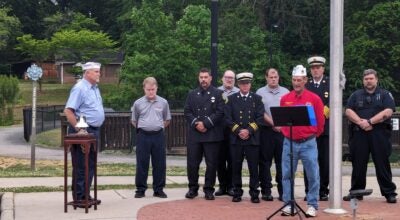Published 12:00 am Saturday, April 28, 2012
By Susan Shinn
For The Salisbury Post
CHINA GROVE — When Patrick King was a toddler, he wandered around the house saying, “And they lived happily ever after,” over and over and over again. He had no idea what the words meant, but he loved the sound of them, the rhythm.
Things weren’t exactly happy around the King household. Patrick’s parents, Susan and David, had no idea what was going on with their son, but they knew there was a problem. Patrick was rarely talking. He was prone to meltdowns. He had the habit of shaking his hands in front of his face. He hated loud noises. Even strong smells bothered him.
“He was so frustrated. I felt so bad for him,” Susan remembers.
When it was time for Patrick to move from the 2-year-old class to the 3-year-old class at his day care, teachers told Susan he wasn’t ready. Rounds of tests followed.
The diagnosis: autism.
At one point, the Kings were told that their son, the youngest of their four children, might even be borderline mentally handicapped.
That was 15 years ago.
Patrick, now 19, is about to graduate from South Rowan High School. He’s won regional honors in swimming. He’s performed in the all-state chorus. And he’s headed to Pfeiffer University this fall on athletic and academic scholarships.
It’s enough to make a mom shout the good news … which in fact she does in a phone call to set up the interview with her son at their China Grove home.
Perfectly understandable. It’s been quite a journey for Patrick and his family. Even though it’s the afternoon following the prom, Patrick is wide awake and wearing his ever-present smile. His date was his good friend, Ava Quick, a senior at Carson High School. They posed for pictures by a waterfall in his beautiful backyard. They went to dinner with a whole passel of classmates. They danced the night away.
“It was great hanging out with all my friends,” Patrick reports.
• • •
Patrick doesn’t really remember his early years.
“When I was young, I was uncertain about a lot of things,” he says. “When we’re young, we don’t know what’s going on in the world.”
His autism made it worse. His three sisters, Katie, Emily and Sarah, couldn’t understand it, either. They couldn’t understand why he didn’t have to do chores like they did. Sarah called him “The Prince” for the longest time. Patrick gets a good laugh when his mom reminds him about that.
Susan and David were taking Patrick to the TEACCH Center in Charlotte for therapy. The center serves individuals with autism. At the urging of therapists, they took the girls. An intern talked with them in German. Next, they were taken into a room where music was played at an ear-splitting level. Finally, they were asked to put on woolly gloves and try to pick up pennies. They couldn’t do or understand anything.
The staff told them, “Patrick’s brain works differently.”
And then they understood.
It’s been good for the girls to have a special-needs sibling, Susan says. “Patrick just became our family’s priority. Our daughters had to learn sacrifice. It’s given them a sensitivity to people who have struggles.”
Katie Morgan, 24, is a sixth-grade science teacher at Corriher-Lipe Middle School. Emily, 23, is a nurse at Rowan Regional Medical Center. Sarah, 20, following in her sister’s footsteps, will graduate from the East Carolina University School of Nursing in 2013.
Susan and David had different reactions to their son’s diagnosis.
“I cried because I knew life was going to be hard for him,” she says. “We were headed in one direction and this was a detour. David said, this is no problem. It’s going to be fine.”
With numerous therapies, it has been.
The transition from elementary school to middle school was hard, Patrick admits. So was the transition from middle school to high school. But he met those challenges of transition. He’s set his own patterns and routines in high school. He’s fixed the same lunch for the past four years: peanut butter and jelly sandwich on whole-wheat bread, sliced apples, strawberries, popcorn and Sprite Zero in a can. He points out that, according to Weight Watchers, that’s a meal worth only 5 points.
He learned to cope with the loud cafeteria. “It’s still loud to me, even to this day. But it’s fine.”
The administration is kind enough to give him a heads-up about fire drills so he won’t be startled. During swim meets, he brings along a camp chair, set off to the side, for when he needs a few minutes to himself in an environment reverberating with noise. When he talks to his teammates, he’s not bothered by his surroundings, and when he’s thinking about swimming, he’s OK, too.
On April 20, when he signed with Pfeiffer, some 15 of his teammates came to the event, along with many of his former teachers and coaches.
“I don’t usually cry,” Patrick says. “I didn’t cry, but I was getting pretty emotional. It was wonderful seeing all these people who care about me.”
Through it all, Susan and David’s faith has been steady.
Soon after Patrick’s diagnosis, Susan went to a Women of Faith conference in Charlotte. The speaker talked about taking your questions to God. So Susan did.
And what she heard was: “You can’t do this. But we can.”
She continues, “We have been able to see God moving in Patrick’s life. He’s a wonderful son. This has been about perseverance and trusting God. He’s been such a blessing to us. There are things in life that are just beyond you, and that’s where you meet God.”
• • •
At Pfeiffer, Patrick will major in computer science.
“In elementary school, I fell in love with video games,” he says. He wants to make a career in game development — developing characters, story lines and the like.
Patrick had always planned to go to college. “I know how job opportunities are so scarce, especially if you don’t have a degree.”
Admittedly, his parents for a time didn’t know whether it would be a possibility. But, Susan says, “I didn’t want to set any limits.”
Patrick was thinking of attending the University of North Carolina at Charlotte, but his parents worried the big campus would overwhelm him. So they were open to other options. Patrick began swimming as a freshman. Two of his three sisters had been on the swim team, and he decided to give it a try. He was 60 pounds heavier then. Swimming and Weight Watchers changed that.
Following the regional swim meet in February, Patrick found out that Pfeiffer was interested in him.
Boy, were they ever.
When the Kings visited campus, they found a reserved parking space for Patrick and banners heralding his arrival.
“They know how to make you feel welcome,” Patrick says, grinning.
“It just felt so right,” Susan says.
Patrick wanted to be ready for the scholarship interviews. He and his mom practiced questions so Patrick would feel comfortable before the interview panel.
“It was a God thing,” he says. “He just helped the interviews to be so good.”
When the interviews were over, Patrick had two-thirds of his college expenses paid.
In talking with the panel, he was open about his autism.
“There is hope,” Susan says. “There can be progress.”
Susan and Patrick have been invited by Partners in Learning to be the keynote speakers at a mini-conference on special needs on May 5 at Catawba College. Their speech is titled, “Blessings and Challenges of Living with Autism.”
Susan has made an outline of her remarks, but Patrick will practice everything he’ll say once a day the week before.
“I feel better when I’m prepared,” he explains.
The next few months, Patrick will prepare to enter Pfeiffer.
“It’s gonna be a big adjustment for me,” Susan admits. “So much time has been put into helping him, but it’s time for him to be more independent. Now he has the opportunity to fly. He’s gonna soar. I think he’ll do great. God has big plans for this young man.”
One day soon, Patrick King will load up his champagne-colored Honda Civic and drive himself down U.S. 52 to Pfeiffer.
And he’ll have his happy ending.
Freelance writer Susan Shinn lives in Salisbury.





